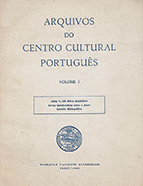

................................
In accordance with Calouste Sarkis Gulbenkian’s will, which emphasised promoting cultural activities in Portugal and beyond, the Calouste Gulbenkian Foundation established the Paris Cultural Centre in 1965. The Centre aimed to promote Portuguese culture in France, with a focus on cooperation with various universities across the country. Its first director, Joaquim Veríssimo Serrão, described the Centre’s activities as a "cultural embassy in France" ( Arquivos ..., 1969, p. 9), serving as a cradle for projecting an image of Portuguese intellectual life. Within this Centre, a need arose to create a doctrinal body to unite French, Portuguese, and Lusophile teachers, researchers, and scholars worldwide. This idea, conceived by Joaquim Veríssimo Serrão, materialised in 1969, the centenary of the Foundation’s patron, Calouste Gulbenkian, with the launch of the publication’s first issue.
In its opening volume, the publication introduced itself as a "doctrinal and informative organ that aims to elevate the values of Portuguese Culture" ( Arquivos ..., 1969, pp. 9-10). One of its main goals was to fulfil the aspirations of numerous enthusiasts of Portuguese culture, creating an ideal platform for engaging with the cultural issues of its time. Since its founding, in alignment with the objectives of the Calouste Gulbenkian Foundation's Paris Cultural Centre, this magazine has sought to complement the Centre’s activities by establishing a presence in universities, academies, libraries, and other literary or scientific institutions. The publication was intended as a vehicle for dissemination, aspiring "to serve, as best as possible, the policy of Luso-French rapprochement in the field of art, science, and education" ( Arquivos ..., 1969, p. 9). This dissemination focused on a culturally inscribed message, "developing the environment of Lusophilia, stimulating its most expressive currents" ( Arquivos ..., 1969, p. 9), to make Portuguese culture more widely appreciated and better known worldwide.
This work is financed by national funds through FCT - Foundation for Science and Technology, I.P, in the scope of the projects UIDB/04311/2020 and UIDP/04311/2020.
